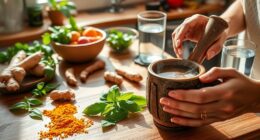We're seeking the best institutions for studying herbalism programs, and we've got you covered. When choosing a school, consider factors like budget, location, and personal goals. Look for accredited programs that offer hands-on learning and align with your career path. Top institutions like Bastyr University, Maryland University of Integrative Health, and Pacific College of Health and Science offer undergraduate, graduate, and doctoral programs that cover essential topics and meet high standards. These schools provide a solid foundation for herbalism careers and can lead to diverse opportunities. As we explore further, we'll uncover more about the best institutions for studying herbalism programs and what they have to offer.
Key Takeaways
• Bastyr University and Maryland University of Integrative Health are top institutions offering accredited undergraduate, graduate, and doctoral herbalism programs.
• Pacific College of Health and Science and Eastern School of Acupuncture also provide well-regarded herbalism programs with a focus on holistic health.
• When selecting a school, consider factors like budget, location, and personal goals, as well as program offerings and accreditation.
• Look for programs accredited by reputable organizations to ensure a high-quality education and enhanced credibility in the field.
• Online and in-person programs are available, offering flexibility and immersive experiences, respectively, to suit different learning styles and preferences.
Choosing the Right Herbalism School
When selecting an herbalism school, we consider a multitude of factors, including our budget, preferred location, and personal goals, to make sure we find a program that aligns with our aspirations.
We evaluate the program offerings, considering whether they cover essential topics like clinical skills, materia medica, and product making, to make certain they align with our interests.
We also utilize resources like HerbMentor and the Herbalism Schools Directory to find the best herbalism school that suits our learning style and career aspirations.
Accreditation is important, so we look for schools with a strong reputation in the herbalism community, positive reviews, and a proven track record of providing quality education.
Moreover, we prioritize hands-on learning opportunities, support, and alignment with our career path when selecting the right herbalism school for our educational journey.
Online Vs In-Person Education

As we weigh our options for herbalism education, we're faced with an important decision: online or in-person learning.
We need to take into account the flexibility in scheduling that online programs offer, allowing us to learn from anywhere with internet access.
On the other hand, in-person programs provide immersive learning experiences that can be invaluable in our herbalism journey.
Flexibility in Scheduling
We can choose between online and in-person herbalism education, each offering distinct advantages regarding flexibility in scheduling. When it comes to flexibility, online herbalism education takes the lead. We can learn at our own pace, anywhere with internet access, and on our own schedule. This flexibility is perfect for those with busy lives or conflicting commitments. Online education also provides interactive learning experiences through live webinars, virtual labs, and discussion forums.
| Online Herbalism Education | In-Person Herbalism Education |
|---|---|
| Learn at own pace | Hands-on experience with plants |
| Internet access required | Direct mentorship opportunities |
| Interactive learning through live webinars | Experiential learning through field trips |
In contrast, in-person herbalism programs offer hands-on experience with plants, practical skills, and direct mentorship opportunities. While they may not offer the same level of flexibility, they provide valuable experiential learning experiences. Ultimately, the choice between online and in-person herbalism education depends on individual preferences, learning styles, and availability to attend classes physically.
Immersive Learning Experiences
While flexibility in scheduling is a significant advantage, we're now ready to explore how online and in-person herbalism education differ in their ability to provide immersive learning experiences. Here, the differences are stark. Online education offers flexibility and access to a wide range of resources, but it often lacks the hands-on experience and direct mentorship that in-person programs provide.
In-person programs allow for:
- Hands-on experience with live plants and herbal preparations
- Direct mentorship from experienced instructors
- A sense of community with fellow students and teachers
- Immediate feedback and experiential learning opportunities
In-person programs, particularly those focused on clinical herbalism, provide an immersive learning environment that's hard to replicate online. However, online education can still be effective, especially for those who prefer self-paced learning. Ultimately, the choice between online and in-person education depends on individual learning preferences and goals. Both paths can lead to successful careers as herbalists, and it's essential to weigh the pros and cons of each before making a decision.
Accredited Herbalism Schools Directory

Our search for accredited herbalism schools leads us to a curated directory featuring top institutions like Bastyr University and Maryland University of Integrative Health. These schools offer a range of undergraduate, graduate, and doctoral programs in herbalism, covering essential topics such as herb identification, medical applications, clinical practice, and acupuncture clinic diagnosis.
Accreditation guarantees that these programs meet the highest standards, providing quality education in herbal sciences and traditional medicine practices. As we explore the directory, we find that graduates of these programs may need to meet post-graduation requirements for licensing in herbalism or acupuncture.
Maryland University of Integrative Health, for instance, offers a Master of Science in Herbal Medicine that prepares students for clinical practice and leadership roles in the field. By choosing an accredited program, we can be confident that we're receiving a thorough education that will prepare us for a successful career in herbalism.
With this directory, we're one step closer to achieving our goals in this traditional medicine field.
Herbal Certification and Accreditation

Herbal certification and accreditation serve as essential benchmarks, guaranteeing that herbalism programs meet established standards of quality and education. We acknowledge that these credentials are vital in ensuring that herbalism programs provide a high-quality education, and that graduates possess the necessary skills and knowledge to become competent herbalists.
To ensure a quality education, we recommend looking for herbalism programs that are accredited by reputable organizations. Accreditation provides a level of assurance to students and employers regarding the credibility and rigor of herbalism programs.
Here are some key points to take into account:
- Accreditation ensures that herbalism programs meet established educational standards.
- Certification from recognized organizations in herbalism can enhance credibility and trust in the knowledge and skills of herbalists.
- Accredited schools follow guidelines set by accrediting bodies to maintain high educational standards in herbalism.
We should prioritize herbalism programs that are accredited by recognized organizations to ensure a quality education and training experience.
Exploring Herbalism Programs Nationwide

As we continue our exploration of herbalism programs, we'll examine the various options available nationwide.
We'll look into the different herbalism education options, from accredited schools to holistic health-focused programs, to help us better understand the landscape of herbalism education.
Herbalism Education Options
We can choose from a range of herbalism programs across the country, each with its unique strengths and specializations. As we explore herbal education options, we find that institutions like the Pacific College of Health and Science, Bastyr University, and the Maryland University of Integrative Health offer a variety of herbal programs.
- Herbal education at the Maryland University of Integrative Health includes a Master of Science program in Clinical Herbal Medicine, with 68 graduates in 2022, the highest among listed schools.
- Bastyr University stands out for its Bachelor of Science in Herbal Sciences and Doctor of Acupuncture programs.
- The Eastern School of Acupuncture and Traditional Medicine and the Southwest Institute of Healing Arts also offer unique herbal programs.
- These institutions provide opportunities to learn about herbalism, gain herbal knowledge, and become a skilled herbal practitioner.
Accredited Herbal Schools
We're exploring the nation's accredited herbal schools, which provide a solid foundation for a career in herbalism and guarantee that students receive a high-quality education.
Maryland University of Integrative Health, for instance, offers Master of Science programs in Clinical Herbal Medicine, accredited by the Maryland Higher Education Commission.
Bastyr University, on the other hand, provides a Bachelor of Science in Herbal Sciences, complete with a medicinal herb garden featuring over 350 herb types, and is accredited by the Northwest Commission on Colleges & Universities.
Other notable institutions include Pacific College of Health and Science in New York, NY, which offers two Herbalism/Herbalist degree programs. Eastern School of Acupuncture and Traditional Medicine in Bloomfield, NJ, and Southwest Institute of Healing Arts in Tempe, AZ, each offer one Herbalism/Herbalist degree program.
These accredited institutions ensure that students receive a thorough education in herbalism, preparing them for a successful career in this field. By choosing an accredited herbal school, students can trust that they're receiving a high-quality education that will serve them well in their future endeavors.
Holistic Health Focus
Let's explore herbalism programs across the nation, uncovering institutions that prioritize holistic health and wellness in their curricula. As we investigate the world of herbalism, we'll discover programs that emphasize a holistic approach to health, combining traditional medicine with modern clinical practices.
Some notable institutions stand out for their commitment to holistic health:
- Maryland University of Integrative Health: Offers a Master of Acupuncture and Oriental Medicine program, covering herbal treatments and clinical practice.
- Bastyr University: Provides a Bachelor of Science in Herbal Sciences, accredited by the Northwest Commission on Colleges & Universities.
- Southwest Institute of Healing Arts: Features a Herbalism/Herbalist degree program, focusing on holistic wellness in a midsize city setting.
- Pacific College of Health and Science: Offers two Herbalism/Herbalist degree programs, emphasizing a holistic health approach in a large city.
These institutions are dedicated to producing well-rounded herbalists, equipped with the knowledge and skills to thrive in the field. By exploring these programs, we can gain a deeper understanding of the role herbalism plays in maintaining peak health and wellness.
Herbal Education and Career Paths

As we begin our journey in herbalism, we find that our educational pursuits can lead to diverse career paths, including home herbalism, product business, or practitioner roles.
We recognize that herbal education is essential in shaping our career paths. Herbalism schools offer certifications that cover clinical skills, materia medica, and product making, which enhance our confidence in herbalism. Although there's no official licensure for western herbalism in the US, formal training at herbalism schools can provide us with hands-on experience with plants.
We can pursue herbalism education through ancestral knowledge, informal mentorship, culinary exploration, online platforms like HerbMentor, or formal training at herbalism schools. When choosing the right herbalism school, we consider factors like budget, location, program length, preferred teachers, personal goals, and interests in herbalism.
Navigating Herbalism Schools Directory

With a wealth of herbalism schools to choose from, exploring the Herbalism Schools Directory becomes an essential step in finding the perfect fit for our educational and professional goals. This all-encompassing directory provides detailed information on accredited herbalism schools, programs offered, reviews, ratings, and contact information.
We can browse through schools offering online and in-person instruction, focusing on various styles of herbalism, and providing diverse learning opportunities.
When perusing the directory, we can:
- Find unique programs like Sacred Gaian Herbalism, Ayurvedic Living School, and Ancestral Arts Apothecary
- Explore schools like Bellebuono School of Herbal Medicine, emphasizing Western Herbal Medicine with a strong focus on botany, chemistry, and anatomy
- Discover schools offering specialized programs in herbalism, such as botanical medicine, herbal pharmacology, and herbal therapeutics
- Get detailed information on each school's curriculum, faculty, and campus life
Frequently Asked Questions
Where Is the Best Place to Study Herbalism?
We're often asked, 'Where is the best place to study herbalism?'
The answer depends on several factors, including the type of program, accreditation, location, and personal goals.
We consider the quality of the curriculum, faculty expertise, and post-graduation requirements, such as licensing exams and state regulations.
What Is the Best Degree for a Herbalist?
We've wondered, what's the best degree for a herbalist?
Well, typically, a Bachelor of Science in Herbal Sciences is the way to go, covering herb identification and medical applications.
However, if we want to take it to the next level, a Master's in Acupuncture and Oriental Medicine or Clinical Herbal Medicine provides advanced knowledge in herbal treatments and diagnosis.
What Is the Best Way to Learn Herbalism?
We believe the best way to learn herbalism is through a combination of formal education and hands-on experience. While formal training at accredited schools provides structured programs, online platforms like HerbMentor offer flexible options.
Mentorship and direct experience with plants are essential. Ancestral knowledge and informal apprenticeships are traditional pathways.
Exploring our interests in home herbalism, product business, or clinical practice helps guide the best approach for each of us.
Where Do Herbalist Make the Most Money?
We've found that herbalists' salaries vary significantly depending on location, experience, and specialization. On average, we earn between $30,000 and $60,000 annually, but states like California, New York, and Washington offer higher salaries, exceeding $70,000.
Surprisingly, working in healthcare facilities or as consultants can lead to higher earnings compared to retail or education settings.
Conclusion
As we wrap up our investigation of top institutions for studying herbalism programs, it's evident that selecting the right school is a vital step towards a fulfilling career in this field.
By emphasizing accredited programs, we can guarantee a well-rounded education that meets industry standards.
While online and in-person options abound, it's important to prioritize programs that align with our individual needs and goals.
With diligence and careful consideration, we can tap into the full potential of herbalism and pave a path towards a rewarding profession.










